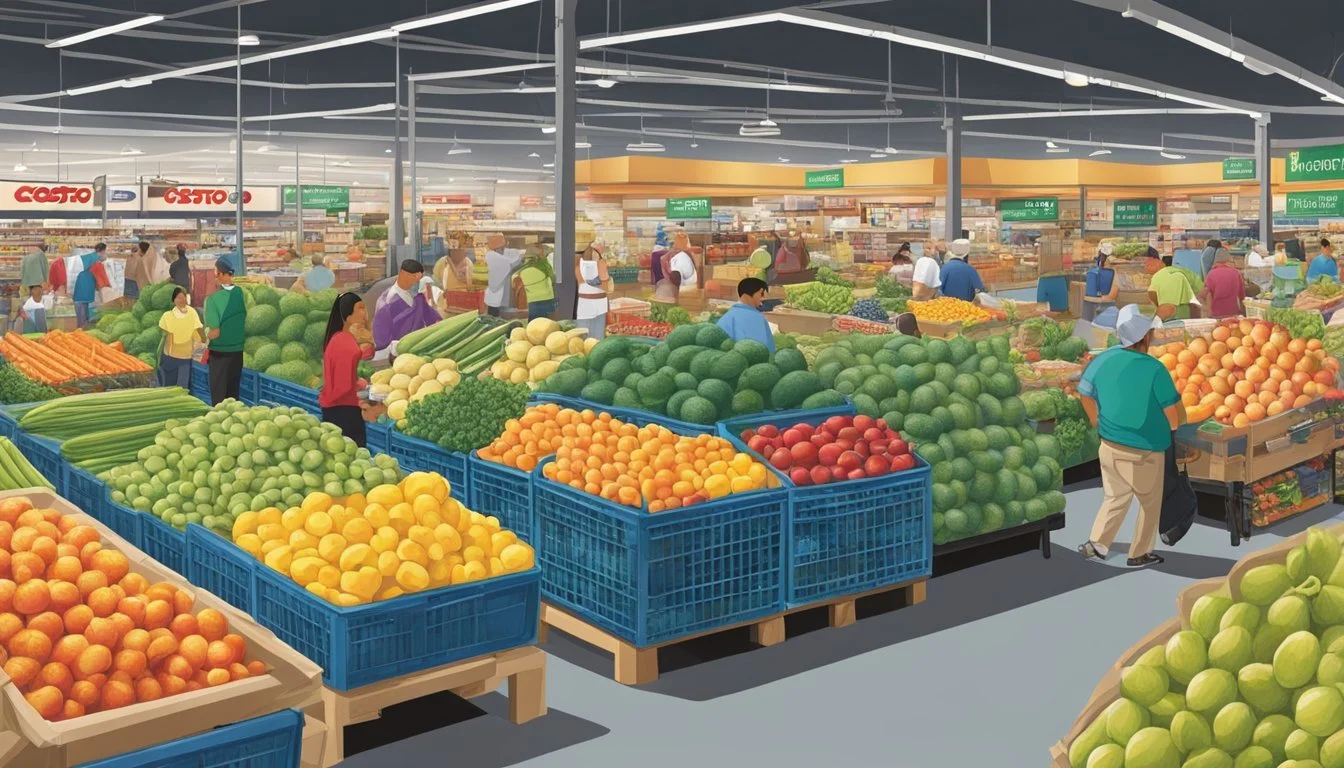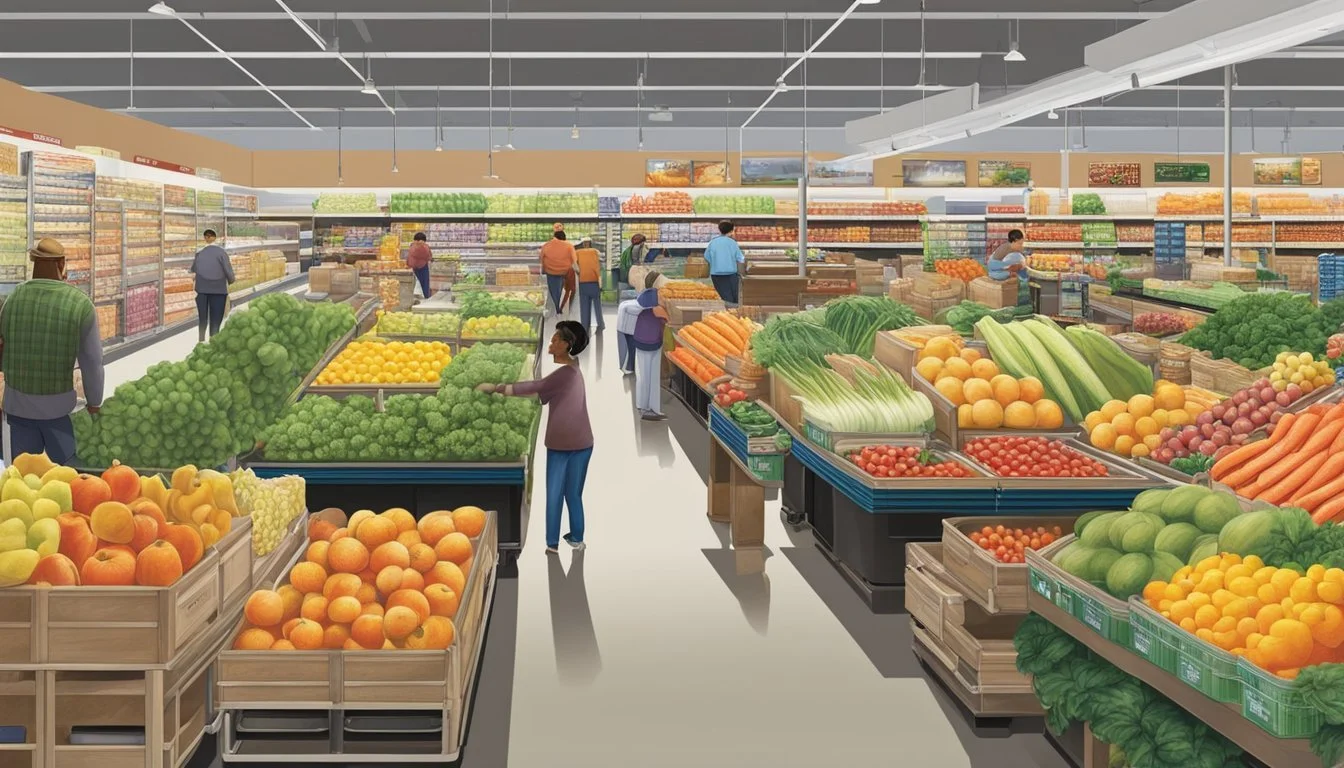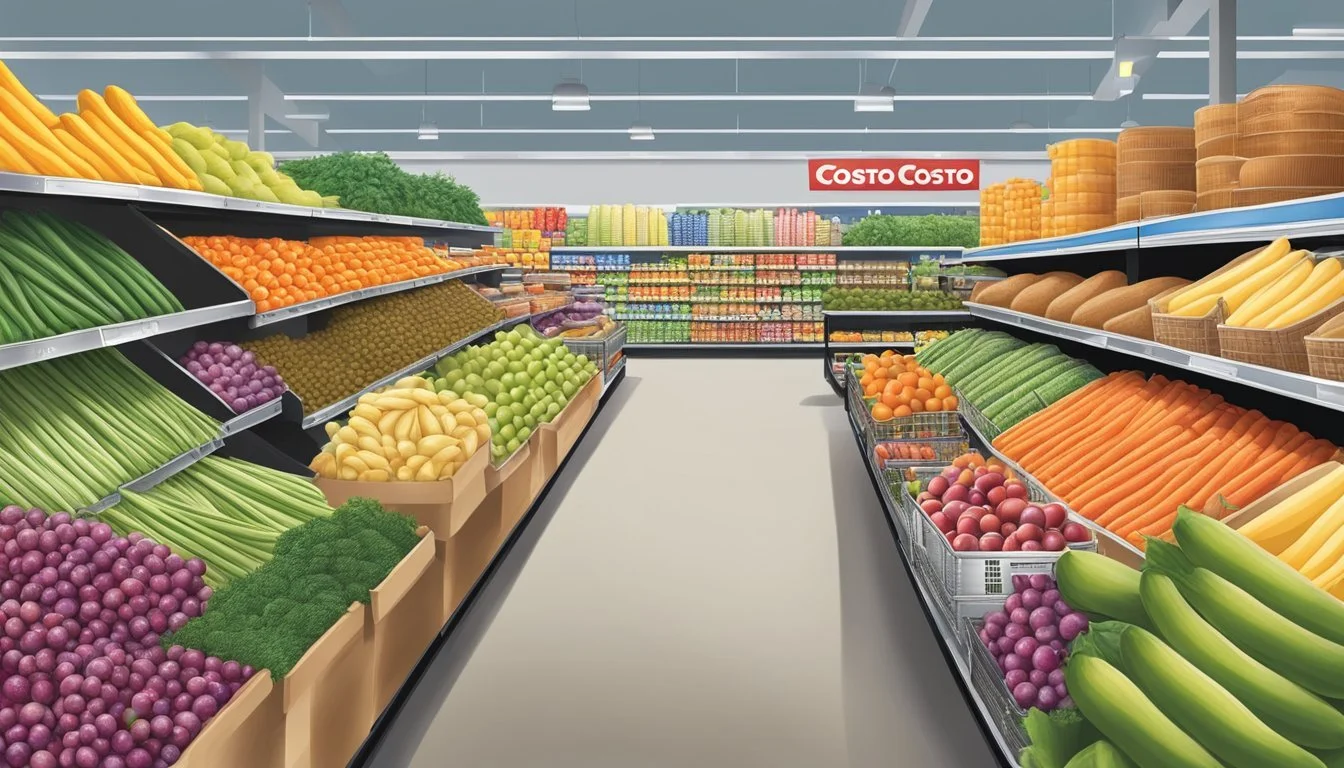Costco vs Cardenas Markets
Comparing Prices, Selection, and Quality
Costco and Cardenas Markets cater to different shopping needs and demographics. Costco, known for its bulk purchases and membership model, offers a wide range of products beyond groceries. Cardenas Markets, on the other hand, specializes in Hispanic foods and fresh produce.
While Costco often provides better prices on bulk items and packaged goods, Cardenas Markets typically offers more competitive prices on fresh produce and specialty Hispanic ingredients. The choice between these two stores largely depends on individual shopping habits, family size, and cultural preferences.
Price comparisons between Costco and traditional grocery stores show mixed results. Some items, like French bread, may be cheaper at Costco, while others might be more affordable at specialty markets or during sales at conventional supermarkets. Factors such as membership fees, travel distance, and storage space should also be considered when deciding where to shop.
Company Overviews
Costco and Cardenas Markets represent two distinct approaches to grocery retail. Costco operates as a membership-based warehouse club, while Cardenas Markets focuses on serving Latino communities with specialized product offerings.
Costco Wholesale Corporation
Costco is a global retail giant known for its warehouse-style stores and membership model. Founded in 1983, the company has grown to over 800 locations worldwide. Costco's business model revolves around selling bulk quantities at discounted prices to its members.
Costco stores typically span 140,000 square feet, carrying around 4,000 carefully curated products. The company is renowned for its Kirkland Signature private label, which offers high-quality items at competitive prices. Costco's product range includes groceries, electronics, clothing, and even travel services.
Members pay an annual fee to access Costco's deals. The company's success stems from its focus on operational efficiency, limited selection, and passing savings to customers.
Cardenas Markets LLC
Cardenas Markets is a regional supermarket chain specializing in Latino cuisine and products. Founded in 1981, the company has expanded to over 50 stores across California, Nevada, and Arizona.
Cardenas stores average 50,000 square feet and carry a wide variety of Latin American groceries, fresh produce, and prepared foods. The company prides itself on offering authentic products and flavors that cater to Hispanic communities.
In recent years, Cardenas has modernized its stores and expanded its reach. The company opened its first Los Angeles area location in Whittier in 2023, showcasing a new store format. Cardenas also operates seven Los Altos Ranch Markets, further expanding its presence in the Southwest.
Membership and Access
Costco operates on a membership-based model, while Cardenas Markets is open to all shoppers. This key difference impacts how customers access and shop at each store.
Costco Membership Model
Costco requires a paid membership to shop at its warehouses. The retailer offers two main membership tiers:
Gold Star: $60 annually
Executive: $120 annually
Gold Star provides basic access to Costco warehouses and online shopping. Executive membership includes additional perks like 2% cashback on eligible Costco purchases.
Memberships grant access to all Costco locations worldwide. Members can bring up to two guests per visit, but only members can make purchases.
Costco's membership model allows the company to offer lower prices on bulk items and exclusive products. The annual fee helps offset operating costs and contributes to Costco's ability to maintain competitive pricing.
Access to Cardenas Markets
Cardenas Markets operates as a traditional grocery store, open to all shoppers without membership requirements. This accessibility makes it convenient for customers to pop in for quick purchases or regular grocery runs.
Cardenas Markets focuses on serving Hispanic communities, offering a wide selection of Latin American products and fresh produce. The stores are typically located in neighborhoods with large Hispanic populations.
Operating hours vary by location, but most Cardenas Markets are open daily from early morning to late evening. This flexibility accommodates diverse shopping schedules and needs.
Cardenas Markets' open-access model allows the company to serve a broader customer base and compete directly with other supermarkets in their local areas.
Range of Products
Costco and Cardenas Markets offer distinct product selections tailored to different shopping needs. Costco focuses on bulk quantities and its own Kirkland Signature brand, while Cardenas Markets provides a diverse array of Hispanic and international goods.
Costco's Bulk Quantities and Brands
Costco's product range revolves around bulk purchases and their private label Kirkland Signature. The store offers large quantities of groceries, produce, and bakery items. Meat selections include bulk packs and popular rotisserie chickens.
Kirkland Signature products span various categories, from packaged foods to kitchen essentials. Costco also carries select furniture pieces and jewelry items.
The warehouse club's inventory extends beyond food, featuring electronics, appliances, and clothing. However, product variety may be limited compared to traditional supermarkets.
Cardenas Markets' Product Diversity
Cardenas Markets specializes in Hispanic and international foods, offering a wide array of fresh produce, meats, and authentic ingredients. The store's tortilleria produces fresh tortillas daily.
Prepared foods like birria, carnitas, and tacos are available at in-store counters. The bakery section features traditional Mexican pan dulce and other baked goods.
Cardenas stocks a variety of packaged products from Latin American brands, catering to specific cultural preferences. The store also carries household items and basic necessities.
While Cardenas may not offer bulk quantities like Costco, it provides a more diverse selection of Hispanic and international products in standard sizes.
Product Quality and Freshness
Costco and Cardenas Markets both prioritize product quality and freshness, but their approaches differ based on their business models and target customers.
Assessing Costco's Fresh Produce
Costco maintains high standards for its fresh produce. The warehouse retailer sources fruits and vegetables directly from growers, ensuring quick delivery to stores. This direct-to-consumer model often results in fresher items with longer shelf life.
Costco's produce section features a rotating selection of seasonal fruits and vegetables. During summer, shoppers can find large quantities of watermelon, berries, and stone fruits. In winter, citrus fruits and root vegetables take center stage.
The store's bulk packaging allows for competitive pricing on fresh items. However, some shoppers find the large quantities challenging to consume before spoilage.
Cardenas Markets' Freshness Commitment
Cardenas Markets specializes in Hispanic and Latino foods, with a strong emphasis on fresh produce. The chain prides itself on offering a wide variety of fruits and vegetables commonly used in Latin American cuisine.
The produce section at Cardenas often includes hard-to-find items like chayote, tomatillos, and various chili peppers. This specialization attracts customers seeking authentic ingredients for traditional recipes.
Cardenas Markets typically receives daily deliveries of fresh produce. This frequent restocking helps maintain the quality and freshness of perishable items. The store also offers a selection of pre-cut fruits and vegetables for customer convenience.
In addition to produce, Cardenas Markets is known for its fresh meat department. The store offers various cuts of beef, pork, and poultry, as well as fresh fish and seafood options.
Pricing and Value
Costco and Cardenas Markets employ distinct pricing strategies to attract customers. Both stores aim to provide value, but their approaches differ significantly in terms of product selection, quantity, and targeted deals.
Comparing Prices at Costco and Cardenas Markets
Costco focuses on bulk quantities, offering lower per-unit prices for larger packages. A market basket comparison reveals Costco's advantage in certain categories. For instance, a 5-pound bag of rice at Costco might cost $8.99, while a 2-pound bag at Cardenas Markets could be priced at $4.99.
Cardenas Markets shines in fresh produce and Latin American specialty items. Their salsas, for example, are often priced competitively and come in a variety of authentic flavors. A 16-ounce container of fresh salsa at Cardenas might cost $3.99, compared to a 32-ounce jar at Costco for $7.99.
Meat prices can vary. Cardenas frequently offers sales on cuts popular in Latin cuisine, while Costco provides consistent pricing on larger quantities.
Exclusive Deals and Discounts
Costco's membership model grants access to exclusive deals and their Kirkland Signature brand, often priced below national brands. Members receive mailers with additional savings on rotating items.
Cardenas Markets relies on weekly specials and loyalty programs. Their circular features discounts on fresh produce, meats, and pantry staples. They also offer digital coupons through their app.
Both stores provide seasonal promotions. Costco's deals tend to last longer, while Cardenas rotates offers more frequently, catering to weekly shoppers.
Cardenas' loyalty program rewards frequent shoppers with points redeemable for discounts. Costco's Executive Membership offers an annual 2% reward on qualifying purchases.
Shopping Experience
Costco and Cardenas Markets offer distinct shopping experiences tailored to different customer needs. Their approaches to store layout, product selection, and customer service set them apart.
Store Layout and Navigation
Costco's warehouse-style stores feature wide aisles and bulk displays. Products are arranged in large sections, with groceries, electronics, and household goods spread across the floor. The layout encourages browsing and discovery.
Cardenas Markets adopt a more traditional supermarket layout. Aisles are organized by product categories, with a strong focus on Hispanic and international foods. The produce section is typically prominent, showcasing fresh fruits and vegetables.
Both stores offer frozen sections, but Costco's is larger and includes more bulk options. Cardenas Markets excel in fresh meat and seafood departments, often featuring in-store butchers.
Customer Service and Satisfaction
Costco is known for its membership model and generous return policy. Employees are generally well-trained and knowledgeable about product locations. Check-out lines can be long during peak hours, but multiple registers help manage flow.
Cardenas Markets pride themselves on personalized service. Staff members are often bilingual and familiar with Hispanic cuisine, offering cooking tips and product recommendations. The stores typically have shorter lines at check-out.
Customer satisfaction ratings tend to be high for both chains. Costco earns praise for its bulk savings and product quality. Cardenas Markets receive positive feedback for their fresh produce and authentic international offerings.
Additional Services
Costco and Cardenas Markets offer unique services beyond typical grocery shopping. These extras enhance the customer experience and provide added value for shoppers.
Costco's Ancillary Benefits
Costco provides a wide array of ancillary services to its members. The warehouse club offers optical centers for eye exams and eyewear purchases. Members can also access hearing aid centers, pharmacies, and tire centers for vehicle maintenance.
Costco's food court is a popular attraction, serving affordable meals like the famous $1.50 hot dog and soda combo. The retailer also sells discounted gas at many locations.
For online shoppers, Costco offers same-day grocery delivery through Instacart. While prices may be higher than in-store, it provides convenience for those unable to visit warehouses.
Costco Travel gives members access to vacation packages, cruises, and rental cars at competitive rates.
Cardenas Markets' Community Engagement
Cardenas Markets focuses on community involvement and cultural connections. The grocery chain hosts cultural events and food festivals, celebrating Hispanic heritage and traditions.
Many Cardenas locations feature in-store taquerias and tortillerias, providing fresh, authentic Mexican cuisine. These offerings cater to the chain's core customer base and attract food enthusiasts.
Cardenas supports local communities through charitable initiatives and sponsorships of youth programs. The company also offers bilingual services and employs staff fluent in Spanish to better serve its customers.
Some Cardenas stores provide check-cashing services and money transfers, addressing financial needs within their communities.
Market Position and Competitor Analysis
Costco and Cardenas Markets occupy distinct niches in the grocery retail landscape. Their market positions reflect different target demographics, product offerings, and competitive strategies.
Costco vs Traditional Supermarkets
Costco's warehouse club model sets it apart from traditional supermarkets. The company focuses on bulk sales and a limited selection of high-quality products at competitive prices. Costco's main competitors include Sam's Club and BJ's Wholesale Club in the warehouse sector.
In comparison to traditional supermarkets like Safeway, Giant, and Market Basket, Costco offers fewer SKUs but larger quantities. This approach attracts value-conscious consumers and small business owners. Costco's private label, Kirkland Signature, competes directly with national brands on quality and price.
Walmart Supercenter poses a significant challenge to Costco, offering a wider product range and convenience. However, Costco maintains an edge with its loyal customer base and higher-income demographic.
Cardenas Markets Within the Ethnic Food Sector
Cardenas Markets operates in the Hispanic grocery niche, competing with other ethnic food retailers. Its primary focus is on fresh produce, meats, and authentic Hispanic products.
Unlike mainstream chains, Cardenas Markets caters specifically to Hispanic consumers and those seeking authentic Latin American ingredients. This specialization allows it to compete effectively against larger chains in its target markets.
Cardenas faces competition from other Hispanic-focused chains like Northgate González Market and El Super. It also competes with mainstream retailers expanding their ethnic food offerings, such as Kroger and Albertsons.
The company's strength lies in its cultural authenticity and understanding of its core customer base. This positioning helps Cardenas Markets maintain a loyal following despite pressure from larger chains entering the ethnic food space.









